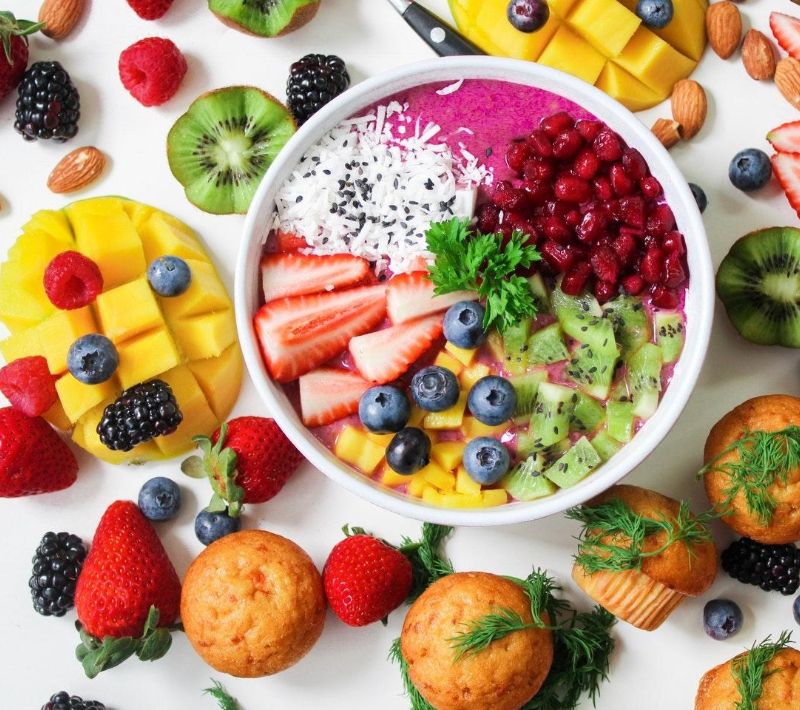When You Are On Your Period: 8 Thing To Eat and 8 To Avoid

Are you one of those who suffer martyrdom when you are on your period? Belly pain, tightness, headache, cramps, or vomiting, and the total havoc menstrual cycles can sometimes unleash? That period of the month when your irritability is at its peak, your emotionality at its peak and your urge to eat irrepressibly.
During menstruation, running can become hell, and to eat healthily may become even more difficult, especially when you dream only of fries and/or sweets. Instead of moping on your couch, know that you have at your disposal a thousand and one natural remedies. Just like any situation in this world, anything can go smoothly if you have a plan!
The strategy that you are going to put in place to avoid the torments of menstruation involves food. You must note that during a period of hormonal upheavals like periods, it is essential to maintain good food hygiene. Eating well helps you keep your body healthy, but most importantly makes you feel good.
For this reason, we have come up with a food plan to make this period less “bloody”. Here are the foods to incorporate into your diet during your period, that will definitely help ‘lighten your sentence.’
Enjoy.
8 Things To Eat When You’re On Your Period

1. Iron-Rich Foods
Iron is a real player in the transfer of oxygen to the muscles. This is why when you lack iron, you can quickly feel very tired or feel a “spinning head” feeling. So where do we find iron in our food? How much do we need? How do you know if you are deficient? Studies have shown that Iron deficiencies mainly concern women – especially during menstruation or during pregnancy.
This is why when you bleed for several days, your loss of iron (the main building block of your blood) is significant. To compensate for this, you need to avoid iron deficiency and the terrible fatigue it causes. You must focus on increasing your iron intake.
Some examples of iron-rich foods that you could incorporate into your diet are liver and organ meats, red meat, baked potatoes, cashews, fortified breakfast cereals, shellfish, spinach, legumes, turkey, broccoli, tofu, beans and lentils, and even dark chocolate. Note: your body cannot produce this iron on its own. So, if you’re going to be losing a lot of it while you’re menstruating, you have to be consistent at replacing it.
2. Foods Rich In Water
All food contains water, but some contain more than others, and these are important for hydrating the body. The human body is made up of 50 to 65% water and it must be well hydrated every day. Dehydration can cause a variety of health problems, including weight gain due to fluid retention and even organ failure. This problem can be treated by consuming foods rich in water.
Estrogens and progesterone influence the hydration levels of your body. And when these hormones jostle, like they do during menstruation or when you have PMS, you need to drink a lot of water to stay hydrated. Especially since the blood lost during menstruation also draws from the body’s fluid level.
When you have your period, you feel bloated and suddenly, you tend to drink less water, which is a mistake because dehydration increases water retention, which can worsen cramps and make you even more swollen. Also, as if headaches and cramps weren’t enough, the bloating that menstruation causes make you want to go to the office in your pajamas.
Furthermore, the best way to reduce bloating is to stay properly hydrated. By making sure to drink water regularly, as well as by consuming foods rich in water, such as cucumbers, watermelon, celery, and broths, the feeling of bloating will decrease, so do not hesitate! To avoid the boredom of the water bottle on the desk, the fruit season being at its peak, you might as well take advantage of it. Choose plants rich in water to hydrate yourself while enjoying the moment.
Examples of foods rich in water are watermelon, melon. cucumber, celery, kiwi, oranges, spinach, broccoli, Brussel sprouts, mushrooms, blueberries, and even tomatoes!
3. Whole Food Products
Whole food products are food products based on whole ingredients, with minimal processing and little or no preservatives and additives. These products include fresh fruits and vegetables, dairy products such as low-fat plain yogurt and whole grains.
Having your period doesn’t mean you’re going to be locked up all day. On the contrary, even if you would like nothing more than to lay in bed all day and watch Netflix, you have a life that needs attention. To attend to all your responsibilities during this time, you need fuel. Energy. To bring enough “fuel” to your body, already tired by what is going on at the time of your period, you should look out for foods rich in whole seeds, and in fiber.
These products allow you to satiate yourself and to alleviate your temporary fatigue over the longer-term. Such whole foods include whole wheat, quinoa, corn, whole grain bread, whole grain pasta, whole grain rice, nuts, seeds, beans, and so on. The thing with whole foods is that they are foods in their most natural state, with barely any processing. These foods are more healthy, and their effects on your body are undiluted.

4. Dairy Products (If You Are Not Intolerant)
According to a recent study, the calcium present in dairy products has the ability to reduce the irritability rate of women during their periods. The calcium level in the blood decreases or is very low in women who suffer from PMS. It is therefore advisable to opt for calcium supplementation (not too high, however) and we can do this either through tablets or, more naturally, by increasing the daily intake of dairy products.
Research has shown that taking 600 mg of calcium once or twice a day can reduce the symptoms characteristic of PMS such as bloating, moodiness, abdominal pain. A recent scientific study indicates that in women who consume four servings of skim milk per day, the risk of suffering from PMS drops by 46%!
Although this might not work for everyone we advise that you choose dairy products enriched with calcium. Use skim milk products over light or semi-skim products. But beyond this “calming” effect, the proteins present in milk are also capable of suppressing your appetite.
Some examples of dairy products are yogurts, cheeses, milk, butter, custard, fermented milk products, and even ice cream!
5. Vegetable Oils
Vegetable oils are extracted from the seeds and fruits of oil plants. They contain many essential vitamins and fatty acids for a rich and varied diet. In dermatology, in aromatherapy as in cosmetics, vegetable oils are also the ideal support for natural recipes to make you feel better and look good.
During your period, your hormone levels hit the ceiling. In the middle of this estrogen dance, you need vegetable fats, also called “good fats”. They are rich in fatty acids and are able to stabilize your hormones as well as to avoid your mood swings. Depending on the particular vegetable oil you decide to use, you can either take it into your body or apply it on your skin.
Ensure you do proper research before going through with it. Vegetable oils include; rapeseed oil, walnut oil, grape seed oil, olive oil, margarine, palm oil, cocoa butter, etc.
6. Root Vegetables
During your period, the wall inside your uterus thins until it breaks down into blood and this is what will then flow out. This process will generate a large production of hormones (estrogens). These hormones will lead to some uncomfortable symptoms like cramps. To reduce these cramps, nothing better than vitamin A or better known as ßeta-carotene.
Root vegetables, known to grow underground have been known to possess an impressive amount of vitamin A. Not only that, but they are also packed with minerals and fiber which makes them a necessary inclusion to your diet during your period.
Foods rich in vitamin A include carrots, sweet potato, pumpkin, kale, beetroots, garlic, turnips, parsnips, onions, radish, ginger, turmeric, etc.
7. Chocolate
You probably never thought this would make the cut as many of us like to think of it as one of our guilty pleasures. Many of us are dying to eat chocolate during their period. But this craving for fun food can actually be deeper than that. Dark chocolate is rich in magnesium and endorphin. The first acting on muscle relaxation and the other on “mental” relaxation. So, there you go. Dark chocolate seems to be essential for survival during menstruation. So stop feeling guilty and let yourself go!
8. Herbal Teas
Herbal teas are drinks brewed from any edible non-tea herbs and spices and they are capable of relaxing you in these times of crisis! Rich in manganese, they will naturally relax you. Chamomile, for example, is a perfect herb for stomach aches. Thyme, on the other hand, will treat your menstrual pain wonderfully.
Ginger, lemon balm, fennel, fenugreek, peppermint, cinnamon, and dandelion herbal teas are great remedies for period cramps. Many of them perform anti-inflammatory functions in your body and act as a pain reliever. They are also very natural, so it’s perfect!

8 Things Not To Eat When You Are On Your Period
Now that we know the food you CAN eat during your period, how about we look at some of the foods you MUST NOT EAT during your period. By reducing your consumption or avoiding these foods, you can reduce certain symptoms that accompany menstruation such as cramps, bloating, acne, etc. Who knows, maybe you’ve been the one aggravating your menstrual cramps all these years without even knowing. So, let’s dive right in!
1. Coffee
Coffee should be banned from your diet during your period for two reasons. The first reason is that it promotes the elimination of magnesium, which is very important at this time of the month as specified above! It also dehydrates the body enormously, causing more menstrual headaches. So, it doesn’t matter if you have to study for a term paper, or you need to make yourself awake during a meeting, coffee will only make matters worse. So, stay away.
2. Alcohol
Alcohol causes the same effect coffee does. Asides that, alcohol will only increase your PMS symptoms and also lower your blood sugar which will make you really irritable, tired, and sick. Alcohol will also dehydrate you, which is bad for you at that particular time. Although you might feel like a bottle of alcoholic beverage will dull the ache, it only comes back worse than before.
3. Excessively Fatty Food
Avoid excessively fatty food like burgers, pizza, chips, and so on at all costs. Because of your raging hormones, sebum is more abundant during this period, so the risk of having serious acne is much higher.
4. Salt And Sugar
During this period, it is important you reduce your salt and sugar intake. They are responsible for the numerous sensations of bloating and water retention;
5. Tobacco
Reduce your tobacco consumption. Nicotine increases cramps.
6. Dairy
Dairy is not totally bad for you during your period. All you have to do is limit your intake. Butter, milk, or cheese increase the production of prostaglandins in the body. Produced in overabundance, they promote contraction of the uterus, which leads to cramps.
This is a comprehensive list of what you should eat, and of what not to eat, when you are on your period, but you can still go-ahead to do some research. It might seem like you’re about to explode from pain when your period cramps begin, but adhering to this food plan will surely go a long way in reducing the pain. Stay beautiful ladies.
All pictures are from pexel.com and no attribution is required
She's an African, Afro-American breed. She's way too radical in her writing style. She adds in a little childish nature to the mix, representing all you want to be but can't.

